Lesson 67~68
✨课文
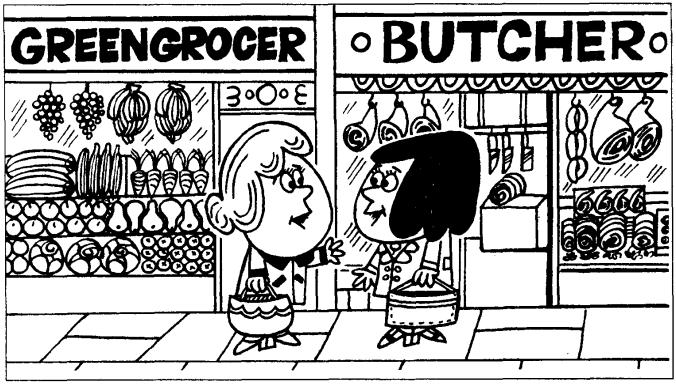
✨单词
一般过去时
⚡本课重点
| be的现在时 | be的过去时 | |
|---|---|---|
| 单数 | am/is | was |
| 复数 | are | were |
一般过去时:动作发生的时间是「过去」,动作没有具体的状态(零状态),常常与表示动作完成的时间状语连用。对应中文语境中的 ...了,但要注意,并不是说在翻译成中文时就必须要带有 ...了;同时也不是只有过去时在翻译成中文时才能带 ...了
本节课主要学习的是 主语+was/were+名词/形容词 句式的「主系表结构」一般过去时,这种句式的谓语是助动词be。在之后的71~72课中再学习 主语+V.ed 的「主谓宾结构」一般过去时
主系表结构一般过去时:助动词be表示动作发生的时间
肯定句:表示过去发生的动作、或存在的事实、状态。
主语+was/were+名词/形容词e.g. I was a student.、We were at home in the morning.
否定句:只需在
be的后面加上not即可。主语+was/were+not+名词/形容词e.g. He wasn't a teacher.、They were not at school.
一般疑问句:只需将
be提到句首(主语前面)即可。Was/Were+主语+名词/形容词e.g. Was she hungry?、Were you happy?
特殊疑问句:在一般疑问句的句首加上特殊疑问词并去掉答案。
特殊疑问词+was/were+主语+名词/形容词e.g. He was a teacher. => Was he a teacher? => What was he job?
先把陈述句中的
be动词提到句首得到一般疑问句,再用what对一般疑问句中的答案teacher进行提问,并将what提到句首
一般过去时常见的使用场景有
表示过去某一具体时间发生的动作或存在的事实、状态,常与表示明确的过去时间状语连用,如
a moment ago、yesterday、last night、last year、last night等e.g. Mike was in China last year.
表示过去一段时间内经常性、习惯性的动作,常与
every day、usually、often等时间状语连用叙述没有具体的过去时间的动作或存在的状态
e.g. They were at school.
否定疑问句:谓语部分为否定形式的疑问句。表示说话者惊异的情绪、责难的口吻或赞叹;也可以表示说话者的某种建议、邀请、请求或看法等
这种句式主要是为了加强语气,尽管形式上是否的的,但却表示强有力的肯定
e.g. Aren't you lucky.
Lesson 69~70
✨课文
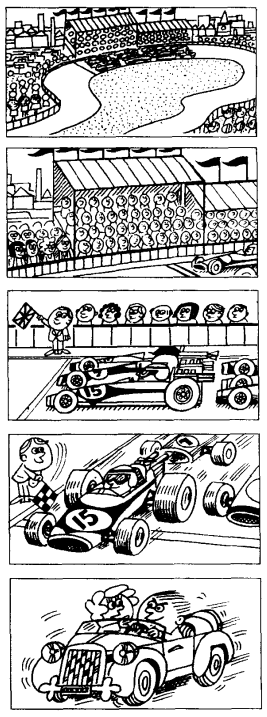
✨单词
⚡本课重点
excited和exciting:都是由excite变化而来,单词本义为「兴奋、激动」
- 以
-ing结尾的形容词可以修饰「人或物」,表示「某人怎么样」或「某物令人感到...」 - 以
-ed结尾的形容词修饰「人」,表示「某人对...感到怎么样」
介词at、on、in的时间短语
介词
at的时间短语通常表示「确切的时间」e.g. at 10 o'clock、at lunchtime、at noon、at Christmas、at the age of 18
介词
on常用于「周」、「月份中的任意一天」或「一天中的某段时间」e.g. on Monday、on April 1st、on Sunday morning、on your birthday、on Christmas Day
介词
in的时间短语通常表示「某一段时间」e.g. in the evening、in March、in summer、in 1999、in the 20th century
Lesson 71~72
✨课文

✨单词
动词过去式变化
⚡本课重点
在67~68课中学习的主要是「主系表结构」的一般过去时。而本节课则主要学习其「主谓宾结构」的一般过去时,核心结构是 主语+V.ed,它的谓语是实义动词V.ed
主谓宾结构一般过去时:隐式助动词did表示动作发生的时间
肯定句:表示过去发生的动作、或存在的事实、状态。
主语+V.ed(+其他)e.g. I loved you.、He talked to me yesterday.、We played with our parents yesterday.
否定句:只需将实义动词改为原形并在其前面加上
did not即可。主语+did not+V.(+其他)e.g. I did not live in Beijing last year.、He didn't talk to me yesterday.
一般疑问句:只需将实义动词改为原形并把
did加到句首(主语前面)即可。Did+主语+V.(+其他)e.g. Did you love me?、Did he talk to me yesterday?
特殊疑问句:在一般疑问句的句首加上特殊疑问词并去掉答案。
特殊疑问词+did+主语+V.(+其他)e.g. He talked to me yesterday. => Did he talk to me yesterday? => What did he do yesterday?
先把陈述句中的
实义动词改为原形,然后在句首加上did得到一般疑问句,最后用what对一般疑问句中的答案talk to me进行提问,并将what提到句首
动词过去式和过去分词的变化:
①一般的动词后面直接加
ed清辅音后面加
ed时,读/t/e.g. talk => talked
浊辅音或元音后面加
ed时,读/d/e.g. need => needed
②以不发音的
e结尾的动词,直接在词尾加de.g. love => loved、live => lived
③以辅音字母加
y结尾的动词,变y为i再加ede.g. study => studied、carry => carried
④以元音字母加
y结尾的动词,直接在词尾加ede.g. play => played
⑤以短元音加一个辅音字母结尾的动词(往往以重读闭音节的形式出现,即
辅元辅),先双写这个辅音字母再加ede.g. stop => stopped、plan => planned
⑥以
ic结尾的动词,直接在词尾加kede.g. traffic => trafficked、picnic => picnicked
⑦不规则变化
e.g. do => did、say => said
time
作为不可数名词时,表示「时间」
作为可数名词时,表示「次数」。3次或3次以上时,通常用
数词+timese.g. once、twice、three times
speak to sb.:表示「与某人说话」
Lesson 73~74
✨课文

✨单词
形容词变副词
⚡本课重点
副词:它在句子中的作用是「修饰动词作状语」。它对动词进行补充说明,告诉我们所修饰的动词在句子中的动作的状态、程度。副词可以是单个的词或词组
形容词变副词的规则
①一般情况下直接在词尾加
lye.g. quick => quickly、pleasant => pleasantly
②以辅音字母加
y结尾词尾
y的发音为/i/的形容词,变y为i再加lye.g. happy => happily、thirsty => thirstily
词尾
y的发音为/ai/的形容词,直接在词尾加ly
③以辅音字母加
le结尾的形容词,变e为ye.g. simple => simply
④以不发音的
e结尾的形容词,去掉e后再加lye.g. true => truly
⑤以
ic结尾的形容词,直接在词尾加allye.g. economic => economically
⑥以
ll结尾的形容词,直接在词尾加ye.g. dull => dully
⑦形容词和副词同形
e.g. hard => well
Lesson 75~76
✨课文
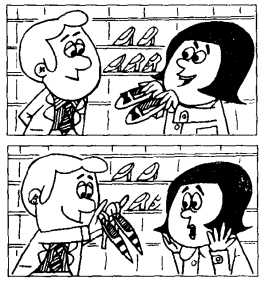
✨单词
陈述句宾语从句
⚡本课重点
本节课先主要学习陈述句做宾语从句的相关概念和基础知识,往后的99~100课和133~136课还会巩固学习这方面的知识
宾语从句:一个句子来充当宾语就叫做宾语从句。主句和从句之间用that连接,但that是可以被省略的。当主句是一般现在时,从句可以用任何时态
跟在表示人的情感或心理活动的形容词后面。
主语+be+形容词(+that)+从句e.g. I'm afraid that I can't come tomorrow.、I'm glad that you can help them.
跟在普通动词后面。
主语+V(+that)+从句e.g. I think that you are right.、She knows that you will come.
给某人买某物
buy sth. for sb.e.g. I bought a book for my sister 2 weeks ago.
buy sb. sth.e.g. She bought her boyfriend a watch.
Lesson 77~78
✨课文
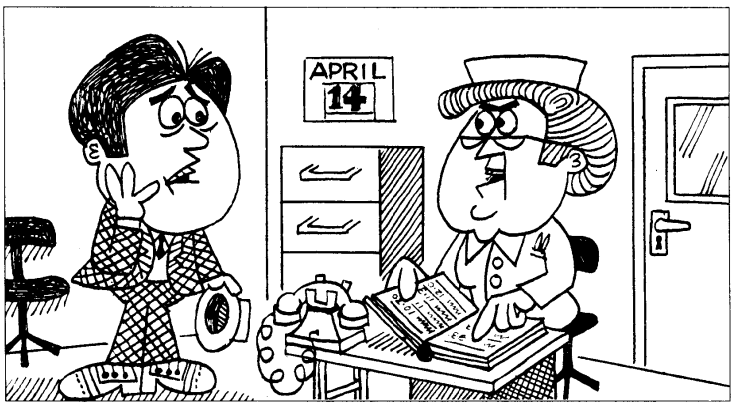
✨单词
⚡本课重点
在之前的69~70课已经初步了解了at、on、in三者在时间表示上的区别,本节课继续做补充
at用于小地点或钟点时刻的前面
- e.g.
at home、at six o'clock
on用于星期的前面或一个月中的具体某一天
- e.g.
on Monday、on April 1st
in用于月份、季节、国家或大地点的前面
- e.g.
in March、in sumber、in China、in Beijing
Lesson 79~80
✨课文

✨单词
have got
⚡本课重点
have和have got:两者所表达的意思相同,都是「有」。have got通常用于口语中,在「过去时态」和「重复动作」这两种情况下,have/has got不能代替have
- e.g. I have a car. = I have got a car.
注意,虽然have got在形式上看起来和现在完成时的结构很像,但have got并不属于现在完成时,它只是英语在演变过程中产生的一种习惯用法罢了
肯定句:表示某人有某物。
主语+have/has got+其他e.g. I have got a car. = I've got a car.、He has got a car. = He's got a car.
否定句:直接在
have或has的后面加上not即可,也可以用助动词do/does。主语+haven't/hasn't got+其他e.g. I haven't got a car. = I don't have a car.、He hasn't got a car. = He doesn't have a car.
一般疑问句:只需将
have或has提到句首(主语前面)即可,也可以用助动词do/does。Have/Has+主语+got+其他e.g. Have you got a car? = Do you have a car?、Has he got a car? = Does he have a car?
特殊疑问句:在一般疑问句的句首加上特殊疑问词并去掉答案。
特殊疑问词+have/has+主语+got+其他e.g. I have got a car. => Have you got a car? => What have you got? = What do you have?
先把陈述句中的
have提到句首得到一般疑问句,再用what对一般疑问句中的答案a car进行提问,并将what提到句首
need:单词本义为「需要」
当作为情态动词时,没有人称、数和时态上的变化,可以直接对其加
not构成否定形式,常用于否定和疑问句中。need+V.e.g. You needn't hurry.、Need I make an appointment?
当作为实义动词时,就要有人称、数和时态上的变化,能用在各种句式中,否定和疑问句时需要用助动词
do/does。need(+to)+V.e.g. He needs some rest.、I don't need to rest.、Do you need to rest?
much和many:都表示「许多」
much:修饰不可数名词,用在否定和疑问句中
e.g. There isn't much tea on the table.、How much money do you want?
many:修饰可数名词,能用在各种句式中
e.g. There are many cars in the park?、There aren't many dishes in the kitchen?、How many photos did you take?
a lot of:表示「许多」。既可修饰可数名词,也可以修饰不可数名词,能用在各种句式中
- e.g. I've got a lot of money.、We've got a lot of apples.、He hasn't got a lot of free time.
转换为在否定和疑问句
如果
a lot of后面跟可数名词,则把a lot of换成manye.g. I've got a lot of friends.、I haven't got many friends.、Have you got many friends?
如果
a lot of后面跟不可数名词,则把a lot of换成muche.g. I've got a lot of money.、I haven't got much money.、Have you got much money?
Lesson 81~82
✨课文

✨单词
have用法③
⚡本课重点
have用法③:have(+a)+名词,作用是将名词「动词化」。其中have作为实义动词使用,可以代替一些常用动词,例如eat、enjoy、drink、take等。这时它就有各种时态上的变化了
- 现在进行时(
be V.ing):I'm having lunch.、She's having a bath. - 一般现在时(
have/has):I have a bath every night.、She has breakfast every morning.- 否定句和疑问句时必须用
do/does:He doesn't have lessons on Friday.、Does he have lessons on Friday?
- 否定句和疑问句时必须用
- 一般过去时(
had):I had a meeting 2 hours ago.、He had a party last night.- 否定句和疑问句时必须用
did:We didn't have lunch.、Did you have lunch?
- 否定句和疑问句时必须用
- 一般将来时(
be going to V.):I'm going to have a bath tonight.
因为到本节课为止只学了这四个时态,所以先只列出这四个时态的用法
Lesson 83~84
✨课文

✨单词
现在完成时
⚡本课重点
现在完成时:动作发生的时间是「过去」,动作的状态是「完成」。核心结构 have/has+V.pp.
此时的have/has在句中的功能类似「主系表结构」中的be动词,用来表示动作发生的时间,而过去分词表示动作的状态。现在完成时不能与表示动作完成的具体时间连用
用法①:「言之过去,意在当下」。大白话讲就是在过去不确定的时间里发生的并与现在有着某种联系的动作,对应中文语境中的 已经...。在之后的89~90课会学习其另一种用法
翻译时需要根据上下文语境和场景,才能知道现在完成时所要表达的真实意思。例如,Do you want to have some food? No, thanks, I have just had some food.,使用现在完成时来回答,字面意思是「我刚才吃过了」,但根据上下文语境,真正想表达的是「我刚才吃过了,肚子很饱,现在吃不下了」
肯定句:
主语+have/has+V.pp.+其他e.g. I've packed my bag.、He has lost his key.
否定句:直接在
have或has的后面加上not即可。主语+have/has+not+V.pp.+其他e.g. I haven't packed my bag.、He hasn't lost his key.
一般疑问句:只需将
have或has提到句首(主语前面)即可。Have/Has+主语+V.pp.+其他e.g. Have you packed your bag?、Has he lost his key?
特殊疑问句:在一般疑问句的句首加上特殊疑问词并去掉答案。
特殊疑问词+have/has+主语+V.pp.+其他e.g. He has lost his key. => Has he lost his key? => What has he lost?
先把陈述句中的
has提到句首得到一般疑问句,再用what对一般疑问句中的答案his key进行提问,并将what提到句首
动词过去分词:过去分词的「规则变化」规律与动词过去式保持一致,在71~72课中已经学习过了。而「不规则变化」只能死记硬背,以后见到一个背一个
's缩写的几种情况
当
's的后面跟着一个名词时,需要结合句子意思进行判断其到底是「is」还是「所有格」e.g. He's a student.、Tony's book is on the desk.
当
's的后面跟着一个V.ing时,表示其为「is」e.g. He's doing his homework.
当
's的后面跟着一个got或动词过去分词时,表示其为have got第三人称或现在完成时第三人称中的「has」e.g. He's got a car.、He's had lunch.
Lesson 85~86
✨课文
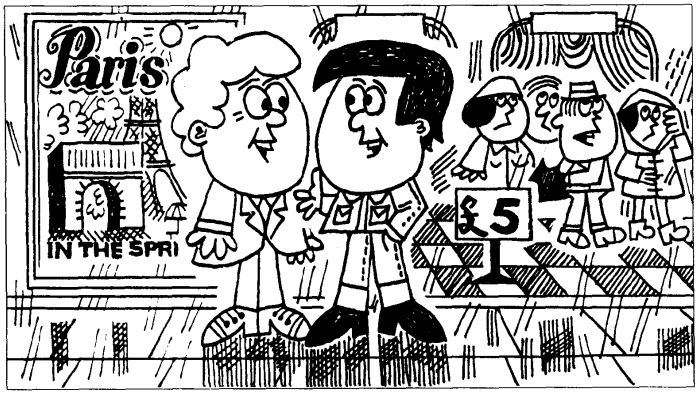
✨单词
⚡本课重点
have/has gone:表示「去了」。去了某个地方(可能在路上也可能已经到了),但是没有回来
- e.g. I went to Beijing last week and I am in Beijing now. => I have gone to Beijing.
have/has been:表示「去过」。去了某个地方并且回来了
- e.g. Sally went to Paris last week and she arrived in Beijing yesterday. => She has been to Paris.
ever:常用于否定句、疑问句,以及表示条件的从句
- e.g. Has George ever been to Paris?
never ever:表示「永远」
- e.g. Never ever give up
Lesson 87~88
✨课文
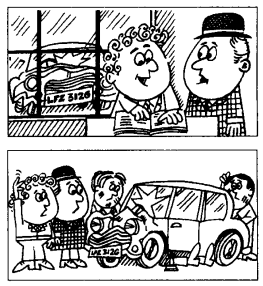
✨单词
动词不定式
⚡本课重点
have用法④:可以和具有动词和名词词性的动词搭配成词组。另外三种用法参考59~60课、61~62课和81~82课
- e.g.
have a look、have a rest、have a crash、have a swin、have a try、have a walk
动词不定式:是一种非谓语动词形式,它没有人称和数的变化,不能在句子中作谓语。其否定形式是在to的前面加not
在英语中,当两个动词紧跟时,它们之间必须加一个不定式符号to。不定式符号后面的动词只能是原形,而不能是过去式或分词形式
当然也是有特例情况的,有些动词是可以在
to的前面加上名词/宾格代词的,即动词+名词/宾格代词+to V.e.g. I want to go school.、Tell him to move it.
| 主动 | 被动 | |
|---|---|---|
| 一般式 | to V. | to be V.pp. |
| 进行式 | to be V.ing | |
| 完成式 | to have V.pp. | to have been V.pp. |
| 完成进行式 | to have been V.ing |
一般式:表示动作通常与谓语动词同时或几乎同时发生,又或是在它之后发生。核心结构为
to V.e.g. He appears to be very happy.、She has decided to sell her car.
进行式:表示正在进行的或与谓语动词同时发生的动作。核心结构为
to be V.inge.g. It happened to be raining when I got there.
完成式:表示动作在谓语动词之前发生。核心结构为
to have V.pp.e.g. I'm sorry to have lost your key.
完成进行式:表示动作在谓语动词之前发生并且一直进行着。核心结构为
to have been V.inge.g. He was said to have been living in London for twenty years.
被动式:当不定式逻辑上的主语是这个不定式表示的动作的承受者时,不定式一般要用被动形式。被动式根据其与谓语动作发生的先后关系,有一般式和完成时两种
被动一般式:
to be V.pp.e.g. These are the books to be given out to the students.
被动完成式:
to have been V.pp.e.g. The novel is said to have been translated into many languages.
修理的四种常见单词的区别
repair:需要有一定的专业技能fix:和repair一样,但更多用在美语环境中mend:一般指修理结构较为简单的东西,不需要特殊的专业技能do up:修理结构更为简单的小东西,例如补衣服,补轮胎
receptionist和attendant:两者都表示「前台服务员」,但在日常生活中,receptionist 的使用频率要比 attendant 高得多
bring:表示「送来、带来、拿来」。在方位上多指朝着说话人而来
yet:表示「直到现在」。用于否定句和疑问句中,通常出现在句尾
- e.g. The train hasn't left yet.、Have you started your new job yet?
try to do sth:尝试做某事
Lesson 89~90
✨课文

✨单词
⚡本课重点
在83~84课中学习了现在完成时的第一种用法,本节课来学习它的第二种用法
现在完成时用法②:一个动作done或者状态been,从过去一直持续或重复到现在的动作或状态。这种用法常常与 for + 时间段(表示持续多长时间)或者 since + 时间点(表示从何时开始)连用。两种用法在结构上是一样的
肯定句:
主语+have/has+V.pp.+其他e.g. I've lived in Beijing since 2008.、He's been working here for 5 years.
否定句:直接在
have或has的后面加上not即可。主语+have/has+not+V.pp.+其他e.g. I haven't lived in Beijing since 2008.、He hasn't been working here for 5 years.
一般疑问句:只需将
have或has提到句首(主语前面)即可。Have/Has+主语+V.pp.+其他e.g. Have you lived in Beijing scine 2008?、Has he worked here for 5 years?
特殊疑问句:在一般疑问句的句首加上
how long,并去掉答案。how long+have/has+主语+V.pp.+其他e.g. I've lived in Beijing since 2008. => Have you lived in Beijing scine 2008? => How long have you lived in Beijing?
先把陈述句中的
have提到句首得到一般疑问句,再用how long对一般疑问句中的答案scine 2008进行提问,并将how long提到句首
Lesson 91~92
✨课文
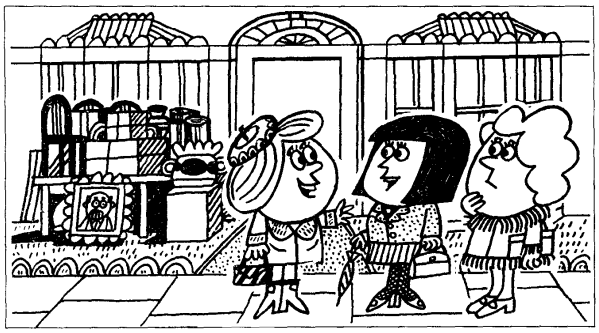
✨单词
⚡本课重点
本节课要学习的是 will/shall+V. 结构的一般将来时。在之前的37~38课中学习了 be+going to+V. 结构的一般将来时
一般将来时:动作发生的时间是「将来」,动作没有具体的状态(零状态)。表示打算、将来要做的事情或将要发生的事情,常与表示将来意义的时间状语连用
注意,其中的will可用于所有人称,而shall只能用于第一人称I和we
肯定句:
主语+will/shall+V.+其他e.g. I'll miss you.、I shall answer the phone.、Tom will be late.
否定句:直接在
will或shall的后面加上not即可。主语+will/shall+not+V.+其他e.g. I won't miss you.、I shan't answer the phone.、They won't get married.
一般疑问句:只需将
will或shall提到句首(主语前面)即可。Will/Shall+主语+V.+其他e.g. Will you miss me?、Shall I answer the phone?
特殊疑问句:在一般疑问句的句首加上特殊疑问词并去掉答案。
特殊疑问词+will/shall+主语+V.+其他e.g. I'll miss you. => Will you miss me? => Who will you miss?
先把陈述句中的
will提到句首,并进行人称调整以符合语义,从而得到一般疑问句,再用who对一般疑问句中的答案me进行提问,并将who提到句首
但注意,will不用来表示事先安排好或决定做的事情
person和people:都表示「人」
person是单数形式,He is a person.people是复数形式,They are people.
Lesson 93~94
✨课文

✨单词
⚡本课重点
before last:上一个
- e.g. the week before last => 前一周
after next:下一个
- e.g. the year after next => 后年
Lesson 95~96
✨课文

✨单词
had better
⚡本课重点
had better:表示「最好、最好还是」,常用来表达某种忠告或建议,用在现在时或将来时中,后面跟动词原形
这里的had并非表示过去时态,而是英语的一种语言习惯,是一种固定搭配用法
肯定句:
主语+had better+V.+其他e.g. You'd better sleep.
否定句:直接在
had better的后面加上not即可。主语+had better+not+V.+其他e.g. You'd better not do that.
in xxx time:表示「在...之后」。单数时用's,复数时用s'。后面的time可以省略
- e.g. in an hour's time、in three days' time、in two weeks' time
plenty of:表示「大量」,后面可以跟可数和不可数名词,只能用于肯定句
- e.g. We've got plenty of time.
Lesson 97~98
✨课文

✨单词
⚡本课重点
belong to sb:表示「属于某人」,第三人称单数的时候belong后面加s,复数时不用加
- e.g. This is my book. => This book belongs to me.
- e.g. These are our letters. => They belong to us.
Lesson 99~100
✨课文

✨单词
⚡本课重点
宾语从句:参考之前的75~76课
直接引语:把别人的原话加上引号进行复述
- e.g. The doctor says, 'I will come at once.'
间接引语:把别人的原话进行人称转换后再说一遍,大白话就是「用自己的话来转述别人说的话」。间接引语其实就是宾语从句,它的动词与主句中的主要动词在时态上必须保持一致
- e.g. The doctor says that he will come at once.
直接引语变间接引语的步骤
- ①去掉引号
- ②转换人称
- ③添加引导词
that
help sb. (to) do sth.:帮某人做某事
offer help to sb.:给某人提供帮助
provide help to sb.:给某人提供(免费的)帮助
Lesson 101~102
✨课文
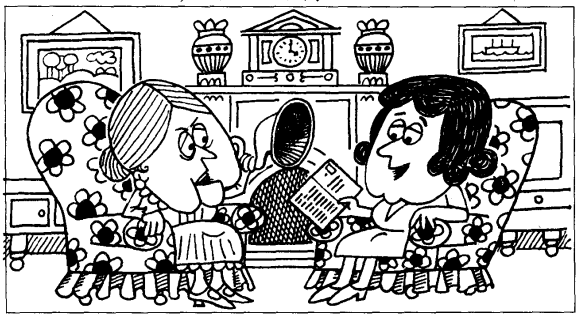
✨单词
反意疑问句
⚡本课重点
反意疑问句:用来询问某种情况是否真实,或者别人是否同意自己。它的组成分为两部分:逗号前面为主句,后面为反意疑问句。在口语中,逗号后的问句可以用right?代替
当前面是肯定句时,后面就是否定句,「前肯后否」
e.g. Sally can speak French, can't she?
当前面是否定句时,后面就是肯定句,「前否后肯」
e.g. Sally can't speak French, can she?
其特点为:
- 问句的主语和主句的主语一致
- 前后的助动词一致
- 前后的时态一致
在语调上的区别:
- 升调:表示疑问,期待对方回答
- 降调:表示确定,不需要回答
Lesson 103~104
✨课文
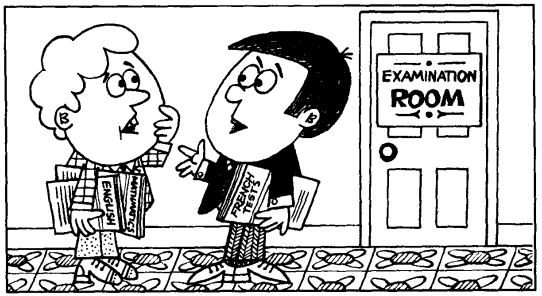
✨单词
⚡本课重点
程度副词:too > very > enough
too:用于表示程度时,其意思为「太、过于」
可以用在
too adj.(+for sb.)+to V. sth.结构中e.g. This skirt is too big for me.、The wall is too high for me to climb.、She is too young to live alone.
enough:单词本义为「足够」
在形容词之后使用,
adj.+enough(+for sb.)+to V.e.g. He failed the exam because it wasn't easy enough.、She is old enough to get married.、This question is easy enough for me to answer.
在名词之前使用
e.g. We don't have enough money.
可以用在
enough ... for sb./sth.或enough ... to V. sth.结构中e.g. e.g. She hasn't got enough money for a holiday.、She isn't old enough to live alone.、There isn't nearly enough time to get there now
could:can的过去式,用法和can几乎一样,具体参考43~44课
hate to do sth.:讨厌做某事(一次性的)
hate doing sth.:讨厌做某事(经常性的)
Lesson 105~106
✨课文
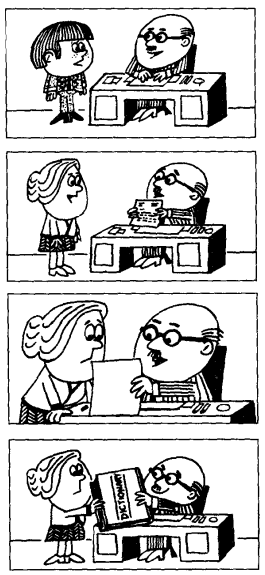
✨单词
⚡本课重点
动词不定式:具体参考87~88课
be full of:一种习惯用法,表示「充满」
- e.g. He is full of energy.、Your story is full of mistakes.
want to do sth.:想要做某事,在口语中,常常把want to说成wanna,即wanna do sth.
- e.g. I want to buy a new car. => I wanna buy a new car.
tell sb. to do sth.:告诉某人做某事
- e.g. Please tell him to bring me some coffee.